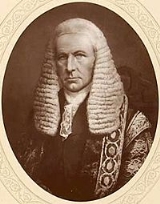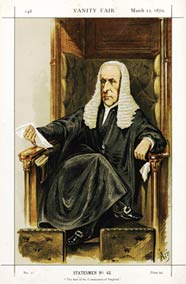
John Evelyn Denison, 1st Viscount Ossington
Encyclopedia
John Evelyn Denison, 1st Viscount Ossington PC (27 January 1800 – 7 March 1873) was a British statesman. He served as Speaker of the House of Commons
from 1857 to 1872.
, Nottinghamshire
, the eldest son of John Denison (d. 1820), and the brother of George Anthony Denison
, a conservative churchman. He was educated at Eton
and Christ Church, Oxford
.
 A Whig, he became Member of Parliament (MP) for Newcastle-under-Lyme
A Whig, he became Member of Parliament (MP) for Newcastle-under-Lyme
in 1823, being returned for Hastings
three years later, and holding for a short time a subordinate position in George Canning
's ministry. Defeated in 1830 both at Newcastle-under-Lyme and then at Liverpool
, Denison secured a seat as one of the members for Nottinghamshire
in 1831. After the Great Reform Act
he represented the southern division of Nottinghamshire
from 1832 until the general election of 1837.
Denison then represented Malton
from 1841 to 1857, and North Nottinghamshire
from 1857 to 1872. In April 1857 Denison was chosen Speaker of the House of Commons
. He was sworn of the Privy Council at the same time. Re-elected at the beginning of three successive parliaments he retained this position until February 1872, when he resigned and was raised to the peerage as Viscount Ossington, of Ossington in the County of Nottingham. He refused, however, to accept the pension usually given to retiring Speakers. Denison gave a justification—referred to as Speaker Denison's rule
— as to why the Speaker casts his or her vote in most cases in favour of, rather than against, a government, where they have the casting vote.
, in 1827, but he left no children. He died on 7 March 1873, and his title became extinct. His Ossington Hall estate passed to his nephew William Evelyn Denison
, son of his brother Sir William Thomas Denison.
Ossington Street
in London
was named in his honour. Lady Ossington died in 1889.
Speaker of the British House of Commons
The Speaker of the House of Commons is the presiding officer of the House of Commons, the United Kingdom's lower chamber of Parliament. The current Speaker is John Bercow, who was elected on 22 June 2009, following the resignation of Michael Martin...
from 1857 to 1872.
Background and education
Denison was born at OssingtonOssington
Ossington is a village in the county of Nottinghamshire, England 7 miles north of Newark on Trent.It is centred around the site of Ossington Hall, the ancestral home of the Denison family. The house was demolished in 1964 and all that remains are a few out-buildings and the private chapel which...
, Nottinghamshire
Nottinghamshire
Nottinghamshire is a county in the East Midlands of England, bordering South Yorkshire to the north-west, Lincolnshire to the east, Leicestershire to the south, and Derbyshire to the west...
, the eldest son of John Denison (d. 1820), and the brother of George Anthony Denison
George Anthony Denison
George Anthony Denison was a Church of England priest.-Life:Brother of politician John Evelyn Denison, 1st Viscount Ossington, he was born at Ossington, Nottinghamshire, and educated at Eton and Christ Church, Oxford...
, a conservative churchman. He was educated at Eton
Eton College
Eton College, often referred to simply as Eton, is a British independent school for boys aged 13 to 18. It was founded in 1440 by King Henry VI as "The King's College of Our Lady of Eton besides Wyndsor"....
and Christ Church, Oxford
Christ Church, Oxford
Christ Church or house of Christ, and thus sometimes known as The House), is one of the largest constituent colleges of the University of Oxford in England...
.
Political career

Newcastle-under-Lyme (UK Parliament constituency)
Newcastle-under-Lyme is a borough constituency represented in the House of Commons of the Parliament of the United Kingdom. It elects one Member of Parliament by the first past the post system of election.- History :...
in 1823, being returned for Hastings
Hastings (UK Parliament constituency)
Hastings was a parliamentary constituency in Sussex. It returned two Members of Parliament to the House of Commons of the Parliament of the United Kingdom until the 1885 general election, when its representation was reduced to one member....
three years later, and holding for a short time a subordinate position in George Canning
George Canning
George Canning PC, FRS was a British statesman and politician who served as Foreign Secretary and briefly Prime Minister.-Early life: 1770–1793:...
's ministry. Defeated in 1830 both at Newcastle-under-Lyme and then at Liverpool
Liverpool (UK Parliament constituency)
Liverpool was a Borough constituency in the county of Lancashire of the House of Commons for the Parliament of England to 1706 then of the Parliament of Great Britain from 1707 to 1800 and of the Parliament of the United Kingdom from 1801 to 1885. It was represented by two Members of Parliament...
, Denison secured a seat as one of the members for Nottinghamshire
Nottinghamshire (UK Parliament constituency)
Nottinghamshire was a county constituency of the House of Commons of the Parliament of England then of the Parliament of Great Britain from 1707 to 1800 and of the Parliament of the United Kingdom from 1801 to 1832...
in 1831. After the Great Reform Act
Reform Act 1832
The Representation of the People Act 1832 was an Act of Parliament that introduced wide-ranging changes to the electoral system of England and Wales...
he represented the southern division of Nottinghamshire
South Nottinghamshire (UK Parliament constituency)
South Nottinghamshire, formally the "Southern Division of Nottinghamshire" was a county constituency represented in the House of Commons of the Parliament of the United Kingdom...
from 1832 until the general election of 1837.
Denison then represented Malton
Malton (UK Parliament constituency)
Malton, also called New Malton, was a constituency of the House of Commons of the Parliament of England in 1295 and 1298, and again from 1640, then of the Parliament of Great Britain from 1707 to 1800 and of the Parliament of the United Kingdom from 1801 to 1885...
from 1841 to 1857, and North Nottinghamshire
North Nottinghamshire (UK Parliament constituency)
North Nottinghamshire, formally the "Northern Division of Nottinghamshire" was a county constituency represented in the House of Commons of the Parliament of the United Kingdom...
from 1857 to 1872. In April 1857 Denison was chosen Speaker of the House of Commons
Speaker of the British House of Commons
The Speaker of the House of Commons is the presiding officer of the House of Commons, the United Kingdom's lower chamber of Parliament. The current Speaker is John Bercow, who was elected on 22 June 2009, following the resignation of Michael Martin...
. He was sworn of the Privy Council at the same time. Re-elected at the beginning of three successive parliaments he retained this position until February 1872, when he resigned and was raised to the peerage as Viscount Ossington, of Ossington in the County of Nottingham. He refused, however, to accept the pension usually given to retiring Speakers. Denison gave a justification—referred to as Speaker Denison's rule
Speaker Denison's rule
Speaker Denison's rule is a constitutional convention established by 19th century Speaker of the British House of Commons, John Evelyn Denison, as to how the Speaker decides on his casting vote in the event of a tie....
— as to why the Speaker casts his or her vote in most cases in favour of, rather than against, a government, where they have the casting vote.
Family
Lord Ossington married Lady Charlotte, daughter of William Bentinck, 4th Duke of PortlandWilliam Bentinck, 4th Duke of Portland
William Henry Cavendish Cavendish-Scott-Bentinck, 4th Duke of Portland PC, FRS, FSA , styled Marquess of Titchfield until 1809, was a British politician who served in various positions in the governments of George Canning and Lord Goderich.-Background and education:Portland was the eldest son of...
, in 1827, but he left no children. He died on 7 March 1873, and his title became extinct. His Ossington Hall estate passed to his nephew William Evelyn Denison
William Evelyn Denison
Captain William Evelyn Denison was a British Army officer and a Conservative Party politician. He owned an estate in Nottinghamshire, where he held several local offices as well as sitting in the House of Commons from 1874 to 1880.- Early life :Denison was the eldest son of Sir William T...
, son of his brother Sir William Thomas Denison.
Ossington Street
Ossington Street
Ossington Street is a quiet one-way street in London, W2, leading from Moscow Road at its north end to the Bayswater Road / Notting Hill Gate at its south end....
in London
London
London is the capital city of :England and the :United Kingdom, the largest metropolitan area in the United Kingdom, and the largest urban zone in the European Union by most measures. Located on the River Thames, London has been a major settlement for two millennia, its history going back to its...
was named in his honour. Lady Ossington died in 1889.

